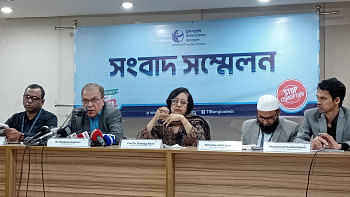Diversification of Shital Pati: Tangail craftsmen preserve ancestral profession

Faced with rising production costs and dwindling demand for traditional Shital Pati (cool mats), craftsmen in Tangail have embarked on a journey of diversification.
Shital Pati, woven from the fibres of a specific type of cane (pati bet), is prized for its smooth texture and natural cooling properties, offering comfort during Bengal's sweltering summers. Using this eco-friendly fibre, artisans are now crafting a variety of innovative products to sustain their ancestral profession.

In addition to Shital Patis, these artisans are producing a range of items, including pottery, trays, table runners, tissue boxes, pen holders, photo frames, shoes, coaster sets, floor mats, and bags. The craftsmen pride themselves on creating products that are visually appealing, durable, and affordable.
Bulu Nandi, a housewife from Hinganagar village in Delduar upazila, explained how her family once relied solely on making Shital Pati. However, they struggled to stay afloat due to increasing production costs, a shortage of raw materials, and plummeting demand.

"It takes two days to collect cane and process the fibre to weave a mat," she said.
"Each mat takes two to three days to make, but we only earn Tk 200 to Tk 250 per mat. This is not enough to survive, so we started making other items from the fibre. We now use boards and stitch with the mat to create different products, which we mostly sell through Karu Angan, an online platform."

Shital Pati mats, made from a special plant fibre that feels naturally cool, have been a staple in Bengal for generations, particularly during the summer. However, with the advent of cheaper alternatives like plastic mats, the demand for these traditional mats has dropped significantly.
Over 5,000 families -- mostly Hindus -- were once engaged in this craft in villages such as Hinganagar, Mushuria, Goziabari, Atia, Singharagi, and Elasin in Delduar upazila, as well as Baghutia, Chatipara, Aultia, Silimpur, Langoljora, and Mohishjora in Kalihati upazila. That number has been reduced by more than half over the past two decades.

Ranjit Kumar, a mat maker from Baghutia, explained how the shortage of cane (pati bet), the primary raw material for mats, has compounded the problem.
"Previously, cane was cultivated on more than 15,000 acres of land in Kalihati and Delduar upazilas. Now, it has decreased by more than 50 percent.

"Cane cultivation takes about three years to yield usable fibre, which discourages farmers. They find crops like paddy more profitable," he added.
Craftsmen also lament the lack of capital and support. "We sit idle for most of the year, except during the summer," said one local maker, who noted that Shital Pati mats are sold at prices ranging from Tk 500 to Tk 2,000.

Despite the challenges, artisans see hope in the growing global demand for environmentally friendly products. Craftswoman Zaoshri Dey Mandira, founder of Karu Angan, emphasised the potential for exporting Shital Pati products abroad.
"If the mat makers receive proper support, advanced training, and access to loans, this industry could thrive," Mandira said. "Arranging exhibitions could open up international markets, but so far, there has been little initiative from the authorities."
Shahnaz Begum, assistant general manager of the Bangladesh Small and Cottage Industries Corporation (BSCIC) in Tangail, acknowledged the issue. She said BSCIC provides loans to small and medium entrepreneurs (SMEs) under a special project.
"However, the craftsmen rarely come to us," Shahnaz said, adding that "To promote local products and attract foreign buyers, we are planning to organise a national-level fair."

 For all latest news, follow The Daily Star's Google News channel.
For all latest news, follow The Daily Star's Google News channel. 



Comments